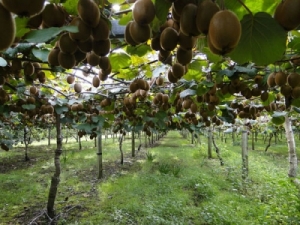MPI Hails Kiwifruit Boom as Horticulture Revenue Surges Past $9 Billion
Ministry for Primary Industries (MPI) Director General Ray Smith is giving a big shout-out to the horticulture sector, especially kiwifruit.
 How profitable do you think the kiwifruit industry would be without a strong science and promotion budget?
How profitable do you think the kiwifruit industry would be without a strong science and promotion budget?
At a forestry event last year a speaker talking about forest owners' spending on science asked, "How much does the kiwifruit industry commit to research?"
Given that our property grows kiwifruit -- and some sheep and beef -- I said "tens of millions" which drew laughter in the audience.
The speaker, addressing his question, said "$30 million to be precise compared to $3m by the forest industry," which brought gasps from some and silence from the majority.
We have an 8.2ha orchard so are a very small part of the total kiwifruit productive platform. The kiwifruit industry's science input benefits from our orchard by about $35,000 per year, based on an average per tray input.
Our orchard's contribution to sales and promotion exceeds $90,000 per year on a per-tray average. I am not privvy to the forest industry's budget, but I doubt it would exceed a few million dollars at best.
How would the red meat or wool sectors stack up in their contribution to science and promotion? Based on a vigorous discussion I heard during a post-duck shooting dinner several years ago, I suspect not great. The two sheep and beef farmers present were convinced I was being ripped off; they said it was not their responsibility to fund such items.
I suggest that the relative strengths and weaknesses of the various industries are in no small part directly linked to their commitment to science and promotion. Having said that, kiwifruit does have an advantage in having a 'single desk' status, which means that all inputs are for the good of all growers and not subject to freeloaders who contribute little but play on the benefits of those who do pay, as may be the case in the other sectors.
No doubt the topic will again arise at next Saturday's dinner. I will again be told I am being ripped off, and that the meat sector is underperforming.
It is a long time since wool warranted a discussion, which is unfortunate because if there is one rural product with a 'kiwifruit' or 'manuka honey story' to tell it must surely be wool.
But then my mates, and most of their compatriots, have clearly indicated they do not see the benefits of committing their hard-earned funds to put wool in the limelight it deserves through science and promotion.
And finally, how profitable do you think the kiwifruit industry would be without a strong science and promotion budget? It must be one of the most unappealing fruits, given its visual attributes. Consider why this fruit is the rock-star of the fruit bowl.
As with most of life, we reap what we sow, and I am happy to continue to fund the science and promotion of my industry.
• Ross Bawden farms at Pukehina, Bay of Plenty.
As New Zealand marks the United Nations’ International Year of the Woman Farmer 2026 (IYWF 2026), industry leaders are challenging the misconception that women only support farming.
Fonterra’s impending exit from the Australian dairy industry is a major event but the story doesn’t change too much for farmers.
Expect greater collaboration between Massey University’s school of Agriculture and Environment and Ireland’s leading agriculture university, the University College of Dublin (UCD), in the future.
A partnership between Torere Macadamias Ltd and the Riddet Institute aims to unlock value from macadamia nuts while growing the next generation of Māori agribusiness researchers.
A new partnership between Dairy Women’s Network (DWN) and NZAgbiz aims to make evidence-based calf rearing practices accessible to all farm teams.
Despite some trying circumstances recently, the cherry season looks set to emerge on top of things.

OPINION: Here w go: the election date is set for November 7 and the politicians are out of the gate…
OPINION: ECan data was released a few days ago showing Canterbury farmers have made “giant strides on environmental performance”.